MOVIES
Itálie, Írán, 2017, 61 min
Camilla Insom, Giulio Squillacciotti
25.01.2019 18:30
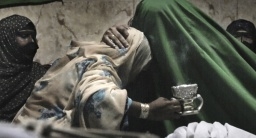 Archipelago is a journey through ancient myths, exorcism rituals, sounds and spirits. In the south of Iran, on a group of islands of the Persian Gulf, humans and spirits coexist since centuries. The culture and traditions of these Islands are the result of the encounters between the African Diaspora, the Arab Countries and Iran, generating a unique system of syncretic beliefs. Spirits of different heritages and origins, called Bād, the Persian word for wind, moving through the air, take possession of the islanders bodies and can only be quieted through a music ceremony called the Zār Ritual. Thanks to an unprecedented access given to foreign film makers, the Film showcases stories and landscape s of the islanders daily life within the frame of the Rituals, giving, through pounding drum rhythms and wailing vocal chorus, a rare and unexpected glimpse of the Islamic Republic of Iran.
Archipelago is a journey through ancient myths, exorcism rituals, sounds and spirits. In the south of Iran, on a group of islands of the Persian Gulf, humans and spirits coexist since centuries. The culture and traditions of these Islands are the result of the encounters between the African Diaspora, the Arab Countries and Iran, generating a unique system of syncretic beliefs. Spirits of different heritages and origins, called Bād, the Persian word for wind, moving through the air, take possession of the islanders bodies and can only be quieted through a music ceremony called the Zār Ritual. Thanks to an unprecedented access given to foreign film makers, the Film showcases stories and landscape s of the islanders daily life within the frame of the Rituals, giving, through pounding drum rhythms and wailing vocal chorus, a rare and unexpected glimpse of the Islamic Republic of Iran.
Camilla Insom, anthropologist lives and works Sulaimaniyah, Iraqi Kurdistan. After completing the MA in Cultural Anthropology at the University of Rome Sapienza, she's currently a Phd candidate in Iranian Studies at University of Naples "L'Orientale".She is in charge of the Anthropological Studies of "Sapienza" University of Rome. Giulio Squillacciotti is Artist, Filmmaker and researcher lives and works in Milan and Maastricht. He studied Medieval Art History in Barcelona and Rome. He owns a MA in Visual Arts from the University of Architecture in Venice IUAV, where he studied Art, Philosophy, Semiotics and Anthropology. His work is mainly oriented on storytelling, cultural apexes and the way traditions re- shape in new contexts.
Direction, production, script, edit: Camilla Insom, Giulio Squillacciotti
Camera: Giulio Squillacciotti
Language of dialogues: Persian
Langiage of subtitles: English, Czech
35th Torino Film Festival - in Competition (December 2017); 27th International Festival of Ethnological Film Belgrade
Trailer: https://vimeo.com/234164343
Francie, Švýcarsko, Malajsie, 2018, 85 min
Caroline Parietti, Cyprien Ponson
25.01.2019 20:00
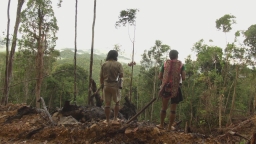 In Sarawak (Borneo), "the ones who live upstream" are the first affected by deforestation. The Penan, (ex) nomadic hunters, are caught in the eye of that storm : how to go on living when one's entire world is being taken apart, when the landscape, which brought meaning to existence, literally disappears and with it language, customs and the spirits? The film, carried by the song of those who refuse to give in, draws the lines of resistance of each one to that deadly fight. It tells of the intimate interweaving of a sweet and secret way of life with the fight which rages in the shadow of the big trees.
In Sarawak (Borneo), "the ones who live upstream" are the first affected by deforestation. The Penan, (ex) nomadic hunters, are caught in the eye of that storm : how to go on living when one's entire world is being taken apart, when the landscape, which brought meaning to existence, literally disappears and with it language, customs and the spirits? The film, carried by the song of those who refuse to give in, draws the lines of resistance of each one to that deadly fight. It tells of the intimate interweaving of a sweet and secret way of life with the fight which rages in the shadow of the big trees.
Caroline Parietti and Cyprien Ponson met during a master's degree in documentary writing (CREADOC/France), after personal journeys in anthropology and community social work. Their work explores issues of memory, violence and resistance in the margins. Cyprien earned a bachelor's degree in anthropology at Lyon 2, and Caroline a first year of ethnology in Neuchâtel (Switzerland) before her studies of community social work during which she started to use camera as an emancipation tool.
Direction, camera, script: Caroline Parietti, Cyprien Ponson
Production: Les Obliques
Edit: Alex Lumbreras
Language of dialogues: Penan language
Language of subtitles: English, Czech
Trailer: https://vimeo.com/282110965
Česká republika, 2019, 60 min
CASA a hosté Antropofestu
24.01.2019 19:50
The Gellner Seminar with guests of the festival Séverine Enjorlas and Magali Bragard, who are the authors of Remake of a Summer.
The seminar will take place on Thursday, January 24, 2019, from 6.15 p.m. at the Lucerne Gallery.
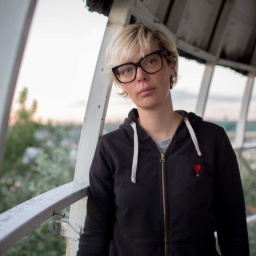
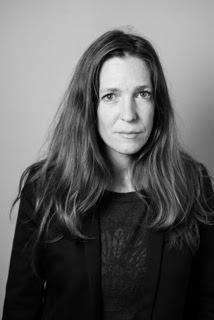
Česká republika, 2017, 8 min
Andrea Luková
26.01.2019 15:45
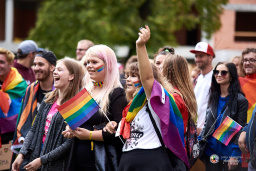 The documentary Shame and Perversity documents the first edition of the LGBT+ Pilsen Pride Festival, which took place in Pilsen 2017. The central theme of the film is "coming out", not only in connection with LGBT + people. What happens when the world of people who take to the streets to spread love and show non-normativity (not only) to the people in Pilsen meets the world of those who went out into the streets with hateful banners and shouts?
The documentary Shame and Perversity documents the first edition of the LGBT+ Pilsen Pride Festival, which took place in Pilsen 2017. The central theme of the film is "coming out", not only in connection with LGBT + people. What happens when the world of people who take to the streets to spread love and show non-normativity (not only) to the people in Pilsen meets the world of those who went out into the streets with hateful banners and shouts?
Andrea Luková studied social and cultural anthropology at the University of West Bohemia in Pilsen. She is currently studying the Masters Program of Anthropology of Past Populations at the Department of Anthropology in Pilsen. His scientific interest is mainly focused on issues concerning the evolution of the carpal area from the African Apes to the Anatomically modern humans, but she has not completely dissociated from the social issues of today's society. The Pilsen Pride project, whose first year is the main theme of the documentary Shame and Perversity, continues to take place this year for the third time.
Director: Andrea Luková
Production: Studio of Visual Anthropology, Department of Anthropology, University of West Bohemia in Pilsen, CZ
Camera, script, edit: : Luková Andrea, Makovičková Tereza, Semeráková Michaela
Language of dialogues: Czech
Language of subtitles: English
Alžírsko, Švýcarsko, 2018, 25 min
Pavel Borecký
26.01.2019 18:30
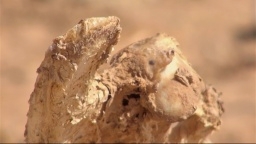 The film situates the viewer within the makeshift space of an animal market in Algeria. Drifting between feeding and waiting, one attunes to the bodies of goats and camels, the oldest companions of Arab men. As we move deeper into the desert, the site turns into a sacrifice zone and reveals its dark geopolitical secrets. The sensory ethnography film will invite you to question the banality of displacement, confinement and exploitation in an out-of-sight territory.
The film situates the viewer within the makeshift space of an animal market in Algeria. Drifting between feeding and waiting, one attunes to the bodies of goats and camels, the oldest companions of Arab men. As we move deeper into the desert, the site turns into a sacrifice zone and reveals its dark geopolitical secrets. The sensory ethnography film will invite you to question the banality of displacement, confinement and exploitation in an out-of-sight territory.
Pavel Borecký is a social anthropologist, non-fiction filmmaker and social innovator. He co-founded an award-winning research organization "Anthropictures", carried out diverse projects in Serbia, Peru, Estonia and Czech Republic, and produced several ethnographic films. Being based at University of Bern, he currently investigates tactics of managing water scarcity in Jordan and works on a new film, book and sound installation.
Director, camera, edit: Pavel Borecký
Production: Institut of Social Anthropology, University of Bern
Script: Pavel Borecký, Franziska Voigt
Language of dialogues: Arabic
Language of subtitles: English, Czech
Trailer: https://vimeo.com/282462351
Belgie, 2017, 85 min
Grace Winter, Luc Plantier
26.01.2019 21:00
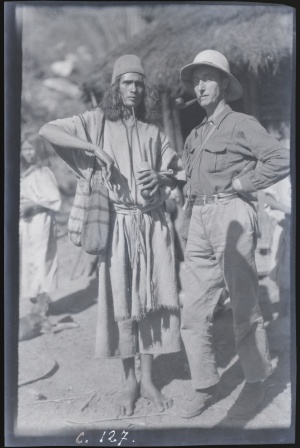 The film invites us to follow the strange path taken by the Marquis de Wavrin, the first white man to film, at the end of the 1920s, the "head shrinking" Shuar Indians. Over 6000 meters of footage filmed between 1920 and 1938 led to his becoming a renowned explorer and ethnographer. Thanks to the safeguarding of this film heritage by the Cinémathèque (the Royal Belgian Film Archive), we are able to learn about the Marquis de Wavrin, defender and friend of the Indians of the Upper - Amazon, and a true filmmaker at heart.
The film invites us to follow the strange path taken by the Marquis de Wavrin, the first white man to film, at the end of the 1920s, the "head shrinking" Shuar Indians. Over 6000 meters of footage filmed between 1920 and 1938 led to his becoming a renowned explorer and ethnographer. Thanks to the safeguarding of this film heritage by the Cinémathèque (the Royal Belgian Film Archive), we are able to learn about the Marquis de Wavrin, defender and friend of the Indians of the Upper - Amazon, and a true filmmaker at heart.
After studying Art History and Social Anthropology at ULB, Grace Winter continued her studies at the Sorbonne for one year, obtaining a mandate from the CNRS (French National Center for Scientific Research) to produce ethnological works in Mali and the Ivory Coast. In 1979, she joined the distribution company Progrès Films, and went on to become a director of the company for 18 years. In 2002, following the closure of Progrès Films, she returned to the Cinémathèque (the Royal Belgian Film Archive) as a researcher
Luc Plantier studied Language Sciences at the University of Avignon, then went on to complete a Masters in Cinema in Lyon. Moving on from theory to practice, he obtained a post-graduate qualification in editing from IAD (The Broadcasting Arts Institution) in Louvain-La-Neuve.
Director: Grace Winter, Luc Plantier
Production: Image Création
Camera: Marquis de Wavrin, Dominique Henry
Script: Grace Winter
Edit: Luc Plantier
Language of dialogues: French
Language of subtitles: English, Czech
trailer: https://vimeo.com/308442558
Česká republika, 2018, 10 min
Viktorie Hermanová, Štěpánka Hemplová, Libuše Pipotová, Andrea Žižková
26.01.2019 15:55
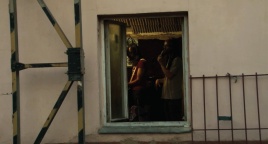
Although communist regime in the Czech Republic has ended a long time ago, the art forms of the underground movement survive until present day. Groups of young people with desire to do what phey please have existed everywhere and always. Rebels have existed, still exist and will exist! Four social anthropology students of West Bohemia University explore present shapes of the underground movement.
Authors are students of the third year of Social Anthropology in the University of West Bohemia in Pilsen.
Director: Viktorie Hermanová, Štěpánka Hemplová, Libuše Pipotová, Andrea Žižková
Production: Studio of Visual Anthropology, Department of Anthropology, University of West Bohemia in Pilsen.
Česká republika, 2019, 30 min
Bohdan Heblík, Petr Hora
25.01.2019 18:00
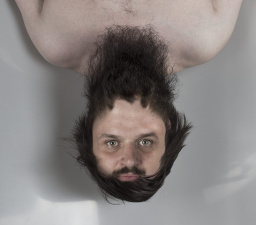
Ready-made poems from an email conversation with the A-team – opening of 10th edition of Antropofest.
Presentation: Bohdan Heblík, piano: Petr Hora
Ten Years of Antropofest, an International Film Festival about social and antropology. Ten posters (2010-2019) mapping the work of Bohdan Heblik, a freelance graphic designer under
www.kofila.com. Ten years of creativity, failure and repetition. Ten experiments on visual language with the subject: the science of human. Ten shades of orange color.
Bohdan Heblík (* 1978) is a freelance graphic designer. He has been working with the A-Team for 10 years. He has participated in all competitions and won all prizes. However, not for the graphic design of Antropofest. He does not study. Portfolio available at www.kofila.com.
Petr Hora (* 1981) was born in Chrudim and studied organ and composition at the Conservatory in Teplice. He has not participated in any competitions or won any prizes. He has been working with Antropofest from its beginnings and created most of the musical backgrounds for the festival jingles. Since 2014, he has been studying composition at the Academy of Performing Arts under Luboš Mrkvička.
Francie, 2017, 96 min
Séverine Enjolras, Magali Bragard
24.01.2019 18:15
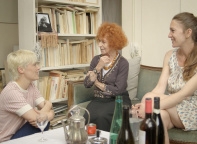 During a summer in Paris and its suburbs, two young directors attempt a remake of "Chroniques d'un été", fifty years after the cult film of Rouch and Morin. An offbeat portrait of nowday's youth, as a mirror image of the 1960s, while questions of the "cinéma vérité" are revisited with fancy.
During a summer in Paris and its suburbs, two young directors attempt a remake of "Chroniques d'un été", fifty years after the cult film of Rouch and Morin. An offbeat portrait of nowday's youth, as a mirror image of the 1960s, while questions of the "cinéma vérité" are revisited with fancy.
Séverine Enjolras and Magali Bragard are both holders of a DEA in visual anthropology obtained in 2003 in Paris 10 - Nanterre, under the direction of Jean Rouch. In 2009 they co-directed a short documentary film, "Dombes", on the study and management of a health risk. They are both teachers in documentary cinema, they created and organized in 2007 and 2008 a festival of films in the West Bank. Séverine Enjolras has also directed several documentaries, institutional films and films around citizen consultation workshops. Magali Bragard, in addition to his work of realization, is also a stage and press photographer.
Director, camera, script: Séverine Enjorlas, Magali Bragard
Production: Survivance
Edit: Magali Bragard, Thomas Laufer
Language of dialogues: French
Language of subtitles: English
Award of Excellence in Visual Anthropology, Ethnocineca, Vienna, Austria
Authors are guests of Gellner Seminar which takes place after screening of theirs movie.
Trailer: https://vimeo.com/237268706
Austrálie, Francie, Pobřeží slonoviny, Maroko, 2018, 81 min
David Fedele, Kumut Imesh
26.01.2019 19:25
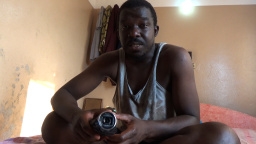 For years, the stories of West African migrants and refugees have been told through the lenses of foreign journalists. Now there is a story from the inside. Revenir follows Kumut Imesh, a refugee from the Ivory Coast now living in France, as he returns to the African continent and attempts to retrace the same journey that he himself took when forced to flee civil war in his country ... But this time with a camera in his hand. Traveling alone, Kumut will be documenting his own journey; both as the main protagonist in front of the camera, as well as the person behind it, revealing the human struggle for freedom and dignity on one of the most dangerous migratory routes in the world. A controversial film experiment, a courageous journey and a unique collaboration between filmmaker and refugee; which is not without consequences.
For years, the stories of West African migrants and refugees have been told through the lenses of foreign journalists. Now there is a story from the inside. Revenir follows Kumut Imesh, a refugee from the Ivory Coast now living in France, as he returns to the African continent and attempts to retrace the same journey that he himself took when forced to flee civil war in his country ... But this time with a camera in his hand. Traveling alone, Kumut will be documenting his own journey; both as the main protagonist in front of the camera, as well as the person behind it, revealing the human struggle for freedom and dignity on one of the most dangerous migratory routes in the world. A controversial film experiment, a courageous journey and a unique collaboration between filmmaker and refugee; which is not without consequences.
David Fedele is an award-winning documentary filmmaker, particularly interested in exploring cultural, humanitarian and social justice issues. His films have been broadcast and screened widely around the world, and he now spends most of his time between the European and African continents. Kumut Imesh, originally from the Ivory Coast, was forced to flee civil war in his country in 2004. Seeking a peaceful and safe place to live, he began the long journey across the African continent before finally arriving in Morocco, where he spent 7 years. While in Morocco he worked closely with NGOs and associations working closely with other migrants, providing support and assistance. In 2013 he met the film director David Fedele in Morocco, and he worked as the translator for the film. During this time, Kumut developed a very keen interest in documentary filmmaking, especially the potential to tell stories from an African perspective, and the original idea to make a film retracing his journey across Africa was born. In 2014 Kumut arrived in Europe, and was granted asylum. He currently lives as a refugee in France, working as a webmaster. He is also the founder and president of ACSORE (Actions of Solidarity for Refugees), an association in France that works for the social and educational integration of asylum seekers and refugees.
Director, script: David Fedele, Kumut Imesh
Production: David Fedele Films
Camera: Kumut Imesh
Edit: David Fedele
Language of dialogues: French, English
Language of subtitles: English, Czech
Trailer: https://youtu.be/nP-vs31b-ZY
Česká republika, 2018, 35 min
Vít Smrčka
26.01.2019 16:35
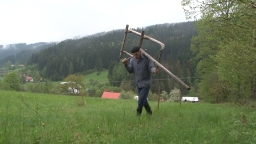 The film depicts the vanishing elements of traditional folk culture in Wallachia. A record of wood transportation on a sledge in the Beskydy mountains is a very valuable part of the film. The film also tells the story of a 96-year-old man who represents the vanishing "old" Wallachia while living in the current technological era.
The film depicts the vanishing elements of traditional folk culture in Wallachia. A record of wood transportation on a sledge in the Beskydy mountains is a very valuable part of the film. The film also tells the story of a 96-year-old man who represents the vanishing "old" Wallachia while living in the current technological era.
Vít Smrčka, the film’s director, graduated in journalism and ethnography. He is the author of a film on hauling wood on sledge in the Krkonoše mountains and also published a book on the history of ethnography. The co-author and cinematographer of the film Aleš Smrčka is also an ethnographer.
Director: Vít Smrčka
Camera: Aleš Smrčka
Production, script: Vít and Aleš Smrčka
Edit: Miloslav Liška
Language of dialogues: Czech
Language of subtitles: none
Jižní Afrika, 2018, 24 min
Roger Horn
25.01.2019 22:05
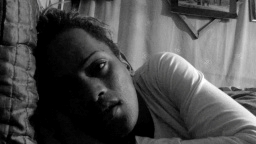 Filmed by Feebee Lee Von Diamond, a transgender wine estate employee in Stellenbosch, South Africa, "The Sisterhood: Visits with my Friends", functions as a continuation and critique of director Roger Horn's 2010 film, 'The Sisterhood" in which Feebee briefly appeared. Feebee observes, provokes, and discusses failed romantic relationships, religion, drunken misadventures, and family loss with her close circle of friends. In opposition to a majority of films on the lives of transgender individuals in the global South, director Roger Horn and Feebee avoid focusing on beauty pageants, sexual organs, or specific transgender rights and instead provide an occasionally uncomfortable insight into the daily hopes, fears, struggles, and losses of this group of friends. On a macro level these vineyard workers are often overlooked in contemporary South African society due to the stigma surrounding the regions employees who have endured a long history of exploitation and alcoholism. On a micro level within their own communities due to their sexual preferences and lifestyle choices this group of long time friends share a bond with viewers that is not always one of conviviality, but ultimately reveals their undying support for one another.
Filmed by Feebee Lee Von Diamond, a transgender wine estate employee in Stellenbosch, South Africa, "The Sisterhood: Visits with my Friends", functions as a continuation and critique of director Roger Horn's 2010 film, 'The Sisterhood" in which Feebee briefly appeared. Feebee observes, provokes, and discusses failed romantic relationships, religion, drunken misadventures, and family loss with her close circle of friends. In opposition to a majority of films on the lives of transgender individuals in the global South, director Roger Horn and Feebee avoid focusing on beauty pageants, sexual organs, or specific transgender rights and instead provide an occasionally uncomfortable insight into the daily hopes, fears, struggles, and losses of this group of friends. On a macro level these vineyard workers are often overlooked in contemporary South African society due to the stigma surrounding the regions employees who have endured a long history of exploitation and alcoholism. On a micro level within their own communities due to their sexual preferences and lifestyle choices this group of long time friends share a bond with viewers that is not always one of conviviality, but ultimately reveals their undying support for one another.
Roger Horn lectures in Visual Anthropology at the University of Cape Town, drawing upon his 19 years of experience across various disciplines and media outlets for inspiration. Additionally, Roger is currently pursuing his PhD in Visual Anthropology where he continues to research and expand upon the material presented in his films about Zimbabwean women residing in Cape Town, S.A., "These Objects, Those Memories" (2015), "Migrant Dilemma" (2017), and "Research / Souvenir (Dialogues)" (2018). This first movie was screened on Antropofest 2017.
Director, production, script, edit: Roger Horn
Camera: Feebee Lee Von Diamond
Language of dialogues: English, Afrikaans
Language of subtitles: English, Czech
Trailer: https://vimeo.com/242777295
Norsko, 2017, 85 min
Lisbet Holtedahl
26.01.2019 14:00
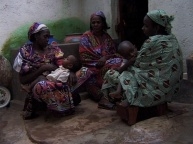 Alhajji Ibrahim is an Islamic scholar. For 46 years, he has served as judge at the Sultanate of Ngaoundéré in Northern Cameroon. The film follows Alhajji during the last years of his life, focusing on the relationships in a polygamous family, seen from the perspective of the wives and their husband. The film (shot in years 1997-2001 and edited only now) presents a way of life that is typical of the societies and cultures of Borno and Adamaoua provinces (Nigeria and Cameroon) where people living far away from the capital centers, struggle to adapt to modern education, strong marginalization and increasing poverty. In recent years, the region has been under constant threat of the Boko Haram insurgency.
Alhajji Ibrahim is an Islamic scholar. For 46 years, he has served as judge at the Sultanate of Ngaoundéré in Northern Cameroon. The film follows Alhajji during the last years of his life, focusing on the relationships in a polygamous family, seen from the perspective of the wives and their husband. The film (shot in years 1997-2001 and edited only now) presents a way of life that is typical of the societies and cultures of Borno and Adamaoua provinces (Nigeria and Cameroon) where people living far away from the capital centers, struggle to adapt to modern education, strong marginalization and increasing poverty. In recent years, the region has been under constant threat of the Boko Haram insurgency.
Lisbeth Holtedahl was born in 1946 in Copenhagen, educated in Oslo and Paris (history of art / anthropology). Professor of anthropology and the founding mother of the Visual Cultural Studies Master's programme at UiT, The Arctic University of Norway in Tromsø. Since 1970 visual ethnographic research in Eastern Niger, Northern Norway and Northern Cameroon.
Director, production, camera: Lisbeth Holtedahl
Edit: Konrad Pilot
Language of dialogues: Fulfude language
Language of subtitles: English, Czech
Trailer: https://vimeo.com/272523236
Česká republika, 2018, 20 min
Ester Kolářová
26.01.2019 17:40
 A short ethnographic film in which six Czech youtubers talk about the YouTube phenomenon. They are reflecting on the influence of YouTube on the society, on their relationship with fans, and why YouTube is so popular. At the same time, the film tries to show the worlds of these six Czech YouTubers.
A short ethnographic film in which six Czech youtubers talk about the YouTube phenomenon. They are reflecting on the influence of YouTube on the society, on their relationship with fans, and why YouTube is so popular. At the same time, the film tries to show the worlds of these six Czech YouTubers.
Ester Kolářová graduated in Social and Cultural Anthropology at the University of Pardubice. Currently, she is a PhD student at the Department of Ethnology in Prague. At the same time, she is studying Documentary Film at FAMU, Prague.
Director, production, camera, script, edit: Ester Kolářová
Langueage of dialogues: Czech
Languegae of subtitles: none
PREMIERE
 Archipelago is a journey through ancient myths, exorcism rituals, sounds and spirits. In the south of Iran, on a group of islands of the Persian Gulf, humans and spirits coexist since centuries. The culture and traditions of these Islands are the result of the encounters between the African Diaspora, the Arab Countries and Iran, generating a unique system of syncretic beliefs. Spirits of different heritages and origins, called Bād, the Persian word for wind, moving through the air, take possession of the islanders bodies and can only be quieted through a music ceremony called the Zār Ritual. Thanks to an unprecedented access given to foreign film makers, the Film showcases stories and landscape s of the islanders daily life within the frame of the Rituals, giving, through pounding drum rhythms and wailing vocal chorus, a rare and unexpected glimpse of the Islamic Republic of Iran.
Archipelago is a journey through ancient myths, exorcism rituals, sounds and spirits. In the south of Iran, on a group of islands of the Persian Gulf, humans and spirits coexist since centuries. The culture and traditions of these Islands are the result of the encounters between the African Diaspora, the Arab Countries and Iran, generating a unique system of syncretic beliefs. Spirits of different heritages and origins, called Bād, the Persian word for wind, moving through the air, take possession of the islanders bodies and can only be quieted through a music ceremony called the Zār Ritual. Thanks to an unprecedented access given to foreign film makers, the Film showcases stories and landscape s of the islanders daily life within the frame of the Rituals, giving, through pounding drum rhythms and wailing vocal chorus, a rare and unexpected glimpse of the Islamic Republic of Iran.
 In Sarawak (Borneo), "the ones who live upstream" are the first affected by deforestation. The Penan, (ex) nomadic hunters, are caught in the eye of that storm : how to go on living when one's entire world is being taken apart, when the landscape, which brought meaning to existence, literally disappears and with it language, customs and the spirits? The film, carried by the song of those who refuse to give in, draws the lines of resistance of each one to that deadly fight. It tells of the intimate interweaving of a sweet and secret way of life with the fight which rages in the shadow of the big trees.
In Sarawak (Borneo), "the ones who live upstream" are the first affected by deforestation. The Penan, (ex) nomadic hunters, are caught in the eye of that storm : how to go on living when one's entire world is being taken apart, when the landscape, which brought meaning to existence, literally disappears and with it language, customs and the spirits? The film, carried by the song of those who refuse to give in, draws the lines of resistance of each one to that deadly fight. It tells of the intimate interweaving of a sweet and secret way of life with the fight which rages in the shadow of the big trees.

 The documentary Shame and Perversity documents the first edition of the LGBT+ Pilsen Pride Festival, which took place in Pilsen 2017. The central theme of the film is "coming out", not only in connection with LGBT + people. What happens when the world of people who take to the streets to spread love and show non-normativity (not only) to the people in Pilsen meets the world of those who went out into the streets with hateful banners and shouts?
The documentary Shame and Perversity documents the first edition of the LGBT+ Pilsen Pride Festival, which took place in Pilsen 2017. The central theme of the film is "coming out", not only in connection with LGBT + people. What happens when the world of people who take to the streets to spread love and show non-normativity (not only) to the people in Pilsen meets the world of those who went out into the streets with hateful banners and shouts? The film situates the viewer within the makeshift space of an animal market in Algeria. Drifting between feeding and waiting, one attunes to the bodies of goats and camels, the oldest companions of Arab men. As we move deeper into the desert, the site turns into a sacrifice zone and reveals its dark geopolitical secrets. The sensory ethnography film will invite you to question the banality of displacement, confinement and exploitation in an out-of-sight territory.
The film situates the viewer within the makeshift space of an animal market in Algeria. Drifting between feeding and waiting, one attunes to the bodies of goats and camels, the oldest companions of Arab men. As we move deeper into the desert, the site turns into a sacrifice zone and reveals its dark geopolitical secrets. The sensory ethnography film will invite you to question the banality of displacement, confinement and exploitation in an out-of-sight territory. The film invites us to follow the strange path taken by the Marquis de Wavrin, the first white man to film, at the end of the 1920s, the "head shrinking" Shuar Indians. Over 6000 meters of footage filmed between 1920 and 1938 led to his becoming a renowned explorer and ethnographer. Thanks to the safeguarding of this film heritage by the Cinémathèque (the Royal Belgian Film Archive), we are able to learn about the Marquis de Wavrin, defender and friend of the Indians of the Upper - Amazon, and a true filmmaker at heart.
The film invites us to follow the strange path taken by the Marquis de Wavrin, the first white man to film, at the end of the 1920s, the "head shrinking" Shuar Indians. Over 6000 meters of footage filmed between 1920 and 1938 led to his becoming a renowned explorer and ethnographer. Thanks to the safeguarding of this film heritage by the Cinémathèque (the Royal Belgian Film Archive), we are able to learn about the Marquis de Wavrin, defender and friend of the Indians of the Upper - Amazon, and a true filmmaker at heart.

 During a summer in Paris and its suburbs, two young directors attempt a remake of "Chroniques d'un été", fifty years after the cult film of Rouch and Morin. An offbeat portrait of nowday's youth, as a mirror image of the 1960s, while questions of the "cinéma vérité" are revisited with fancy.
During a summer in Paris and its suburbs, two young directors attempt a remake of "Chroniques d'un été", fifty years after the cult film of Rouch and Morin. An offbeat portrait of nowday's youth, as a mirror image of the 1960s, while questions of the "cinéma vérité" are revisited with fancy. For years, the stories of West African migrants and refugees have been told through the lenses of foreign journalists. Now there is a story from the inside. Revenir follows Kumut Imesh, a refugee from the Ivory Coast now living in France, as he returns to the African continent and attempts to retrace the same journey that he himself took when forced to flee civil war in his country ... But this time with a camera in his hand. Traveling alone, Kumut will be documenting his own journey; both as the main protagonist in front of the camera, as well as the person behind it, revealing the human struggle for freedom and dignity on one of the most dangerous migratory routes in the world. A controversial film experiment, a courageous journey and a unique collaboration between filmmaker and refugee; which is not without consequences.
For years, the stories of West African migrants and refugees have been told through the lenses of foreign journalists. Now there is a story from the inside. Revenir follows Kumut Imesh, a refugee from the Ivory Coast now living in France, as he returns to the African continent and attempts to retrace the same journey that he himself took when forced to flee civil war in his country ... But this time with a camera in his hand. Traveling alone, Kumut will be documenting his own journey; both as the main protagonist in front of the camera, as well as the person behind it, revealing the human struggle for freedom and dignity on one of the most dangerous migratory routes in the world. A controversial film experiment, a courageous journey and a unique collaboration between filmmaker and refugee; which is not without consequences. The film depicts the vanishing elements of traditional folk culture in Wallachia. A record of wood transportation on a sledge in the Beskydy mountains is a very valuable part of the film. The film also tells the story of a 96-year-old man who represents the vanishing "old" Wallachia while living in the current technological era.
The film depicts the vanishing elements of traditional folk culture in Wallachia. A record of wood transportation on a sledge in the Beskydy mountains is a very valuable part of the film. The film also tells the story of a 96-year-old man who represents the vanishing "old" Wallachia while living in the current technological era. Filmed by Feebee Lee Von Diamond, a transgender wine estate employee in Stellenbosch, South Africa, "The Sisterhood: Visits with my Friends", functions as a continuation and critique of director Roger Horn's 2010 film, 'The Sisterhood" in which Feebee briefly appeared. Feebee observes, provokes, and discusses failed romantic relationships, religion, drunken misadventures, and family loss with her close circle of friends. In opposition to a majority of films on the lives of transgender individuals in the global South, director Roger Horn and Feebee avoid focusing on beauty pageants, sexual organs, or specific transgender rights and instead provide an occasionally uncomfortable insight into the daily hopes, fears, struggles, and losses of this group of friends. On a macro level these vineyard workers are often overlooked in contemporary South African society due to the stigma surrounding the regions employees who have endured a long history of exploitation and alcoholism. On a micro level within their own communities due to their sexual preferences and lifestyle choices this group of long time friends share a bond with viewers that is not always one of conviviality, but ultimately reveals their undying support for one another.
Filmed by Feebee Lee Von Diamond, a transgender wine estate employee in Stellenbosch, South Africa, "The Sisterhood: Visits with my Friends", functions as a continuation and critique of director Roger Horn's 2010 film, 'The Sisterhood" in which Feebee briefly appeared. Feebee observes, provokes, and discusses failed romantic relationships, religion, drunken misadventures, and family loss with her close circle of friends. In opposition to a majority of films on the lives of transgender individuals in the global South, director Roger Horn and Feebee avoid focusing on beauty pageants, sexual organs, or specific transgender rights and instead provide an occasionally uncomfortable insight into the daily hopes, fears, struggles, and losses of this group of friends. On a macro level these vineyard workers are often overlooked in contemporary South African society due to the stigma surrounding the regions employees who have endured a long history of exploitation and alcoholism. On a micro level within their own communities due to their sexual preferences and lifestyle choices this group of long time friends share a bond with viewers that is not always one of conviviality, but ultimately reveals their undying support for one another. Alhajji Ibrahim is an Islamic scholar. For 46 years, he has served as judge at the Sultanate of Ngaoundéré in Northern Cameroon. The film follows Alhajji during the last years of his life, focusing on the relationships in a polygamous family, seen from the perspective of the wives and their husband. The film (shot in years 1997-2001 and edited only now) presents a way of life that is typical of the societies and cultures of Borno and Adamaoua provinces (Nigeria and Cameroon) where people living far away from the capital centers, struggle to adapt to modern education, strong marginalization and increasing poverty. In recent years, the region has been under constant threat of the Boko Haram insurgency.
Alhajji Ibrahim is an Islamic scholar. For 46 years, he has served as judge at the Sultanate of Ngaoundéré in Northern Cameroon. The film follows Alhajji during the last years of his life, focusing on the relationships in a polygamous family, seen from the perspective of the wives and their husband. The film (shot in years 1997-2001 and edited only now) presents a way of life that is typical of the societies and cultures of Borno and Adamaoua provinces (Nigeria and Cameroon) where people living far away from the capital centers, struggle to adapt to modern education, strong marginalization and increasing poverty. In recent years, the region has been under constant threat of the Boko Haram insurgency. A short ethnographic film in which six Czech youtubers talk about the YouTube phenomenon. They are reflecting on the influence of YouTube on the society, on their relationship with fans, and why YouTube is so popular. At the same time, the film tries to show the worlds of these six Czech YouTubers.
A short ethnographic film in which six Czech youtubers talk about the YouTube phenomenon. They are reflecting on the influence of YouTube on the society, on their relationship with fans, and why YouTube is so popular. At the same time, the film tries to show the worlds of these six Czech YouTubers.